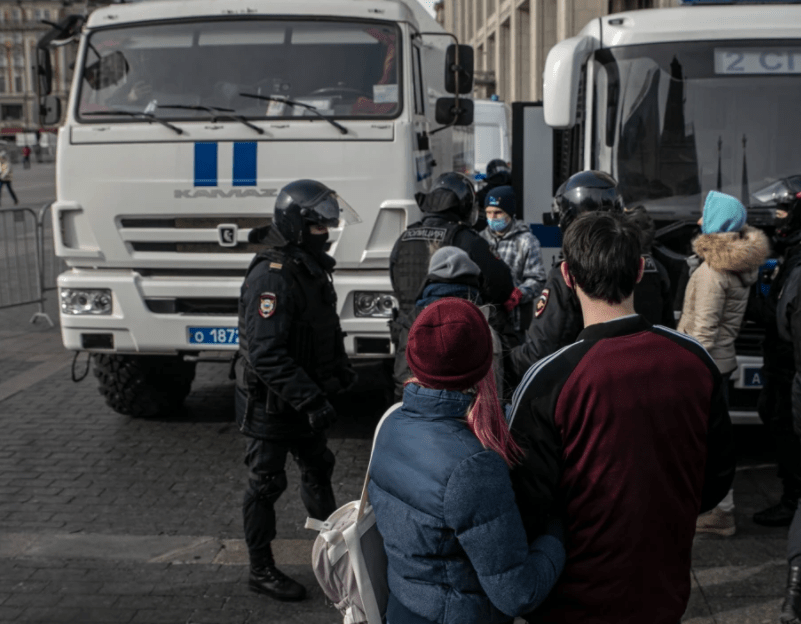By Makar Sitkin – for Novaya Gazeta, Moscow
[Editorial note: this is an important article in one of the few the Russian opposition websites still functioning, Novaya Gazeta, showing the degree of ferment among students and the opposition to the invasion of Ukraine and the difficulty the authorities have in keeping the lid on].
…………………………………………
Since the beginning of the “special operation” in Ukraine, students of Russian universities have been actively protesting: they have signed petitions and open letters, they are outraged on social networks, and they go to rallies. The state reacts with repression. What are the consequences faced by students of Russian universities?
Already on February 24, the commandant and (according to the student himself) an FSB officer came to the student at Novosibirsk State University, who hung the Ukrainian flag on the window of his dorm room. Both demanded to remove the flag. The dean of his faculty commented on the incident, “We can’t do anything from our side. Don’t break wood! The police, the FSB will apply the most stringent measures against protesters, sympathizers and opposers.”
Students of the Faculty of Bioinformatics and Bioengineering at Moscow State University also reported that police officers came to the university and threatened to be expelled for rallies. “Detective Vladimir asked the educational department about two students, and also said that these students would be expelled if they went to an anti-war rally,” reports the student magazine DOXA.
The dean of the faculty confirmed this information, saying that this was done as part of the prevention of offenses, and the country’s main university is out of politics.
“the scope of anti-Russian rhetoric has reached boiling point”
At the same time, a statement from the Association of Rectors of Medical and Pharmaceutical Higher Educational Institutions was posted on the university’s website, stating that “the scope of anti-Russian rhetoric and propaganda has reached a critical boiling point.”
But not everyone is expelled and not immediately. Some are “luckier” a little more – so far, they have only been threatened. Students of the St. Petersburg State Institute of Culture were sent messages threatening expulsion: “Students who attend unauthorized meetings and demonstrations will be punished (up to and including expulsion).”
The situation at the Higher School of Economics in Nizhny Novgorod is no better: the police came to meet students, promising to expel the participants of the March 6 rally. Law enforcement officers said that when a person is detained, he falls into a certain “list”, and the presence on it subsequently makes it difficult to career in state bodies.
To be subjected to pressure, it is not at all necessary to go to rallies. A student of the Kuban State University Yulia (name has been changed) contacted the editorial office of Novaya Gazeta. She and several other students were called in for an interview with an “integrated security” officer. Such employees are responsible not only for direct fire, anti-terrorist and any potential “physical” danger that threatens students and teachers of the university, but also for interaction with law enforcement agencies.
Repressive actions began in higher education, as if on cue
The reason for the call was an open letter from Russian students, which was signed by more than 15,000 people, including KSU students. The conversation consisted of the employee retelling to the students the main theses of Putin’s address of February 21: the danger of NATO for Russia, denazification, “Ukraine named after Vladimir Lenin.”

The letter that sparked the conversation was launched by the Community student union on the first day of the “special operation”, February 24th. However, it was recently removed from the web. Similar open letters were launched by some major universities in the country.
But Russian higher education can boast not only of repressive actions that began as if on cue. A manual was sent down to universities from above on how to explain to students what is possible and what is not.
The Nash Sever portal reports that students of the Timiryazev Academy are being intimidated by the Criminal Code article on fakes, amendments to which were recently adopted by the State Duma. The students sent the publication a whole protocol of the group meeting (which means that the event was officially held). At the lecture, students were told about the criminal liability for “discrediting the Armed Forces of the Russian Federation and their actions to protect the country and maintain peace” and collected signatures from them about attending the event.
This is another method to control students: to collect signatures from them about the visit – it does not matter whether it is a faculty meeting, a militarized lecture or a pro-government rally – all moves are recorded.
Two students already expelled
The RANEPA also noted: the university reminded students of the obligation not to commit illegal acts that damage the reputation of the university. In addition, the management asks not to make any statements on social networks. The rector’s office of the academy supported the “special operation”, and Alena Paramonova, the curator of the business informatics department, said that two students had already been expelled due to participation in rallies.
A student at the Moscow University of Food Production told the Takie Dela portal that on February 28, a representative of the university administration suggested that the elders hold group discussions with a request not to publish information “contrary to laws and morality” on social networks. The next day, one of the teachers threatened students with expulsion for participating in public events.

Mytishchi branch of MSTU in Bauman [Bauman Moscow state Technical University] was threatened with expulsion for attending rallies on March 6, not only for students, but also for teachers – they could be fired.
A Novaya Gazeta source confirmed this information: on March 3, there was a meeting of course curators during which “this topic was discussed”: “you need to warn the students, otherwise they will go [to the rally – MS] – they will be expelled.”
Another area of work of universities is to attract students to the demonstration of militarism. At the Don State Technical University (Rostov-on-Don), students are gathered for a kind of “flash-mob from the government” – 200 people are needed. Additional points are awarded for visiting.
But not only this is offered to DSTU students. In it and several other universities in the Rostov region, an action was held to support the “special operation”: the letters Z appeared on the buildings of educational institutions and dormitories, formed by burning windows on dark facades.
As you know, a flash mob in support of the Russian army in Ukraine was held in one of the Kazan shopping centres with the participation of more than 1,000 students. According to The Insider*, participation was mandatory, and it was possible to refuse only on an explanatory note.
Manuals sent to educational institutions to educate students
Finally, on March 4, the Russian Union of Rectors supported President Putin and his decision to conduct a “special operation” in Ukraine.
People getting higher education create a problem for our state. If teachers try to convince schoolchildren with their still “fresh” heads of the benefits of “forcing Ukraine to peace”, then it is clearly more difficult with students.
Manuals, papers in folders, are sent to dozens of educational institutions of various levels. Rectors swear allegiance to the higher leadership, there are reports from all over the country about the arrival of the police and other moral teachers in universities, the Ministry of Education is holding an “open lesson”, in which a 12-year-old girl was given one of the main roles. (But what about the reinforced concrete principle of the authorities “children outside politics”?)
But no surge of “patriotism” happened. Somewhere a couple of dozen state employees were kicked out with the flags of the “DPR” and “LPR”, somewhere the owners of several cars pasted the letter Z on the glass…even the increased degree of television hysteria did not raise a wave. Therefore, the desperate rectors and deans of Russian universities have no choice but to carry out demonstrative flogging with spiritual values in university classrooms.
* The Ministry of Justice entered the publication into the register of media outlets that act as a “foreign agent”
This article is from Novaya Gazeta. The original can be found here. All pictures from Novaya Gazeta.



